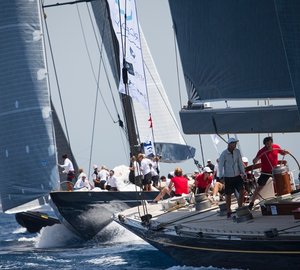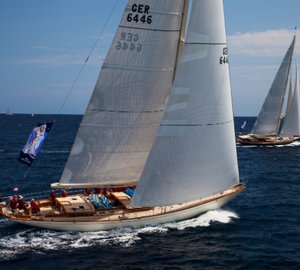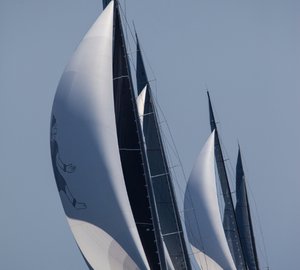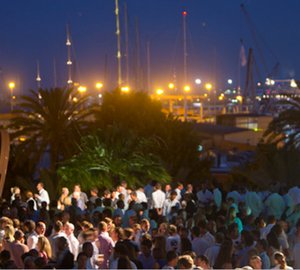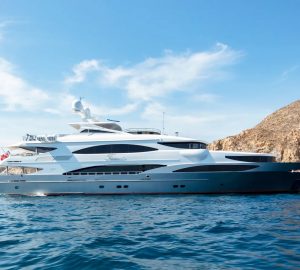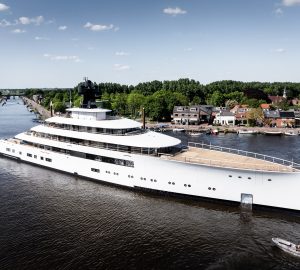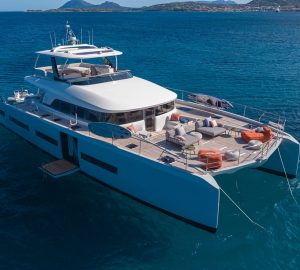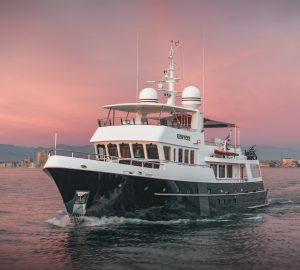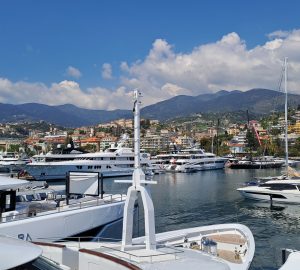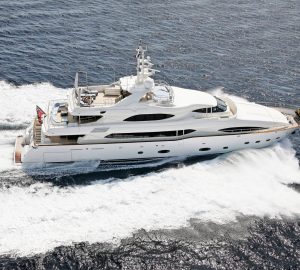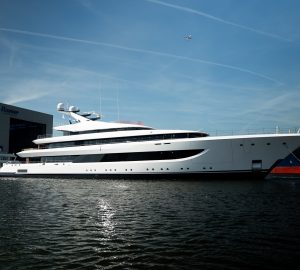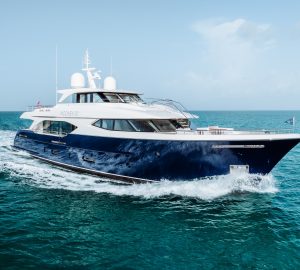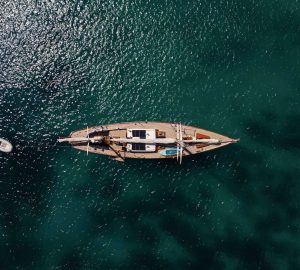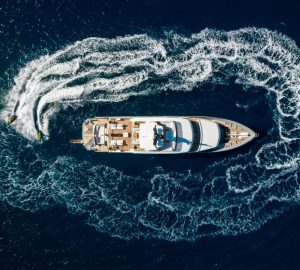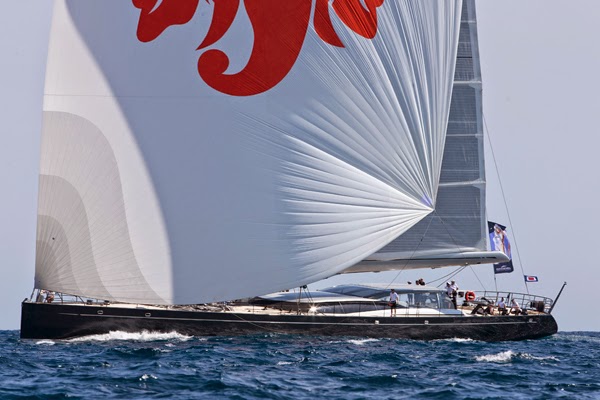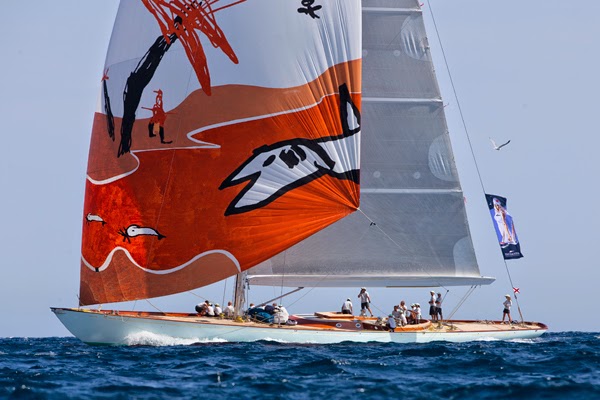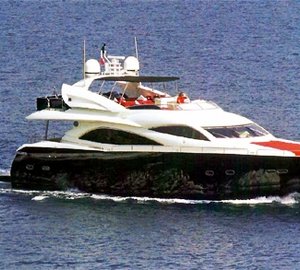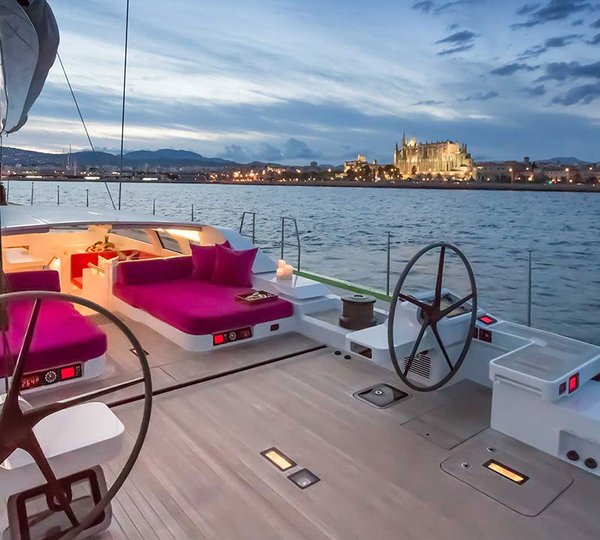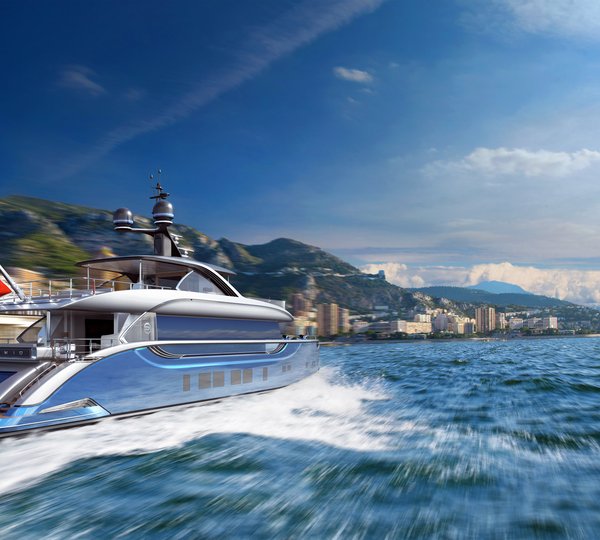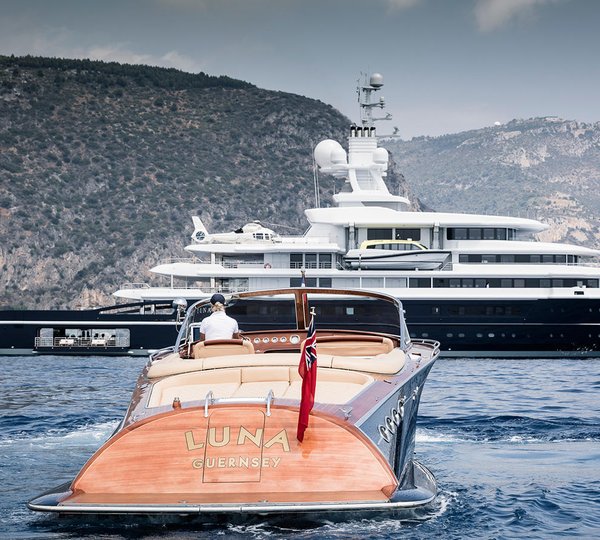The breath-taking Mediterranean yacht charter destination – Bay of Palma set a typical challenge for the Superyacht Cup Palma 2014 fleet, making their first coastal course of the regatta. With progressive changes in pressure as well as wind direction as the 21 yacht fleet crossed the bay and passed upwind and downwind, it was the teams, which had the best handle on the big picture and could second guess the changes, which rose to the top of the three classes.
While the five strong J Class did their second windward-leeward of the week, a coastal course of 28.6Nms was set in the SSWly sea breeze. Crucial choices were to take the left of the first beat where there was more wind pressure and a beneficial left shift, and, correspondingly to recognise the breeze becoming lighter and shifting back as the fleet raced downwind towards the shore.
The sea breeze built from a gentle 8 to 9kts for the first starters of the fleet which is set of at two minutes staggered intervals. By mid race there were 13-16kts at times which placed a premium on good boat handling and excellent communication. Those teams which had not sailed together before or had changes in line up found they suffered against the crisper crew work around the intense course.
The course opened with a four miles upwind leg, rounding a mark to starboard on to a fetch which some could set Code Zeros, before a three miles downwind leg. With the breeze easing it was important to compensate and keep up the boat speed sailing higher angles. There was then an upwind leg to the Sech mark on the outer edge of the bay, followed by a fetch to the centre of the bay, then rehoist the spinnaker. Then it was upwind to a port rounding and then a critical reach to the finish with the breeze lifting approaching the finish.
Aboard sailing yacht Ganesha, the 46m/149ft new Dubois design, the local knowledge of navigator Nacho Postigo and firm understanding of the impending changes in the breeze of tactican Matt Humphries were the foundations of their comfortable owner driven win in Class 1. They won their seven boat division by over seven minutes.
“It was interesting.” Postigo recalled, “ It was a very typical day on the Bay of Palma when the wind in the morning is the Xaloc wind which is more southerly. The more you go out of the bay the more it goes to the left. And more importantly there is a big difference in pressure. The left side of the bay has much more pressure. On the left you can have 15 or 16 kts of pressure while on the right it can be quite light and so the course was interesting because it mixed the two sides of the bay. It was difficult to predict what was going to happen next on the course. Our guys on the boat did a very very good job manoeuvring the boat, on the bow and at the mast.”
Among the keys to their success were choosing the left side of the first beat and giving themselves a fast, high passing lane coming into the first mark which allowed them to pass many boats unhindered: “Our first leg was the best, where we probably did best. Compared to the boats around we looked to have overstood the layline but that let us come in with speed and we could roll the whole line. In these things when you start so far behind the important thing is the passing lanes. We managed to get a very good passing lane there, getting five or six boats in a row there. And the gybe sets at the marks, playing the right shifts on the downwind legs. Our owner drives all the time and loves it.”
Meanwhile Postigo is enjoying a big change between his own solo Mini 6.50 project and navigating the superyachts. He has just won his first solo race from Rome, raced the Superyacht regatta in Sardinia, delivered the Mini back to Palma to jump on board the 149 footer Ganesha.
“It is a contrast from the 20 footer to the 150 footer. I finished from Rome and went to do Sardinia on the big boat then went and delivered the boat here and now back on the 150 footer. It is a bit bizarre to come back and have a whole lot of people on the boat when you are used to being on you own.”
Another Palma sailor was making winning calls in Class 2. Superyacht Gaia, the 101ft/30.6m Spirit Yachts won with Miguel Sanchez calling the shots on his home waters: “We made some little mistakes but overall we sailed generally well, in the end the big boats overtook us when the breeze is up. We have some new crew and it is their first time with us and there was some disorganisation in the boat handling and manoeuvring but for sure the last race will be our best!
“We did Loro Piana earlier in the month and have some new crew since after refitting through last winter. In Sardinia our kites were not so good but we have a different one here, we were much better today so we are quite happy here.”
And last year’s overall winner, sailing yacht Heartbeat, the Hoek designed Classen built 80ft/24m sloop, was back to her winning ways in Class 2. The first boat to start she finished just under four minutes ahead of second placed charter yacht Maria Cattiva.
J Class
If Wednesday’s J Class race for the King’s Hundred Guineas Cup at Palma’s Superyacht Cup proved inconclusive, superyacht Hanuman and luxury yacht Lionheart finally being required to share the top trophy, there were no such doubts cast about the winners of the second windward-leeward race of the series.
Lionheart took the lead on the second beat and extended progressively to win by one minute and five seconds ahead of luxury yacht Rainbow across the finish line after three laps of racing.
Racing conditions were something close to Palma’s sea breeze best. The wind built from a relatively gentle 7-9kts at the start to 16kts on the third round to provide some sparkling downwind sailing with the five J Class yachts pushing their crews increasingly hard.
Charter yacht Ranger won the pin end of the start and were able to quickly gain the left side of the course which, as is often the case, proved the passport to a good lead at the first windward mark. But at the leeward gate they let the prowling Lionheart separate to the left hand gate mark, work back to the left again – toward the bluff, cliff lined Cabo Blanco shore – and the Lionheart crew which has Bouwe Bekking as tactician converted a 15 seconds deficit to a lead of more than one minute at the second windward turn.
Rainbow’s profit was not as valuable but they rose to earn a well deserved second place.
After a modest start Hanuman pulled through to cross the finish line third but dropped behind Ranger on corrected time.
Bekking, who skippers the Team Brunel Volvo Ocean Race team, was pleased to have kept the ‘winning’ record of Lionheart intact, claiming a share of Wednesday’s top trophy as a victory!
“ We had a good start and so far our crew work has been excellent so it is good and our owner has been driving superbly. It is all coming together nicely and so we have our seven wins in a row.”
He was less enthused by the idea of a head to head match with Hanuman for the Cup: “Maybe.” He grinned, “ But I think he is quite handy at that. So maybe we should not go there.”
Bekking believes the J Class racing here keeps him and some of his core crew sharp for the upcoming Volvo Ocean Race: “I made this commitment to sail these three regattas before the Volvo came along but I think this is really got for us who are on the Volvo as we are in a good racing environment, it is good for my communication and relationship with Andrew Cape the navigator and we have four guys from the team here. It all fits in really well and it keeps me sharp.”
Of their success to date he concludes: “We have worked hard on the boat and as a crew. We have a great group of people and a great owner-driver. There is much more pressure with the pro driver. Our owner says to just relax from start to the finish. I sometimes get a bit tense but you want it to be good for everyone on board. I made a mistake at the start yesterday and I have to put my hand up for that one.”
Rainbow’s helm, Holland’s five times Olympian Mark Neeleman, was delighted with second: “The competition is so complete here with five boats that we are very happy to get second today, the boat is going very well, nice and quick. The wind shifted 15 or 20 degrees to the left on the second beat and we got that with Lionheart. It was a good side of the course. Our Italian team at the back Francesco (De Angelis) and Michele (Ivaldi) worked it well. We are very happy with the result. Everything went well, we are working all the time to get better. The boat is relatively new and we are changing and modifying the crew a little and getting better all the time. We have sailed the least together of all the teams I think so it is pleasing today. We have had five boats a couple of times but all the teams are getting better all the time, this is the best competition there is. The differences are minimal and so you can’t make mistakes. You have to do everything right if not you go from first to fourth.”

